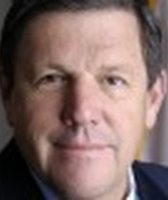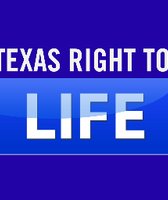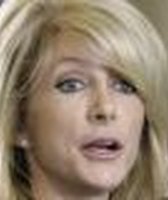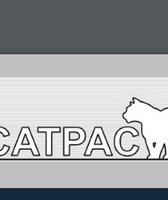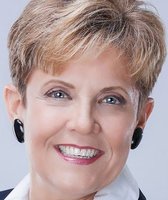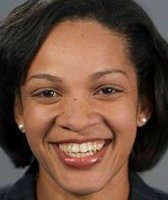Stand up for the facts!
Our only agenda is to publish the truth so you can be an informed participant in democracy.
We need your help.
I would like to contribute
Business group leader says businesses pay roughly 60 percent of taxes in Texas
As taxpayers faced the deadline for federal returns, Texas Gov. Rick Perry called for $1.6 billion in tax cuts for businesses in Texas.
His proposal was "right and proper," business leader Bill Hammond said at Perry’s April 15, 2013, press conference, because "Texas businesses pay roughly 60 percent of all taxes that are paid in Texas today."
PolitiFact Texas checked a similar statement in 2011, rating as Mostly True a state senator’s claim that businesses "pay most of the taxes" in Texas.
Do businesses currently pay 60 percent?
Hammond told us by phone that he intended his remark to encompass both state and local taxes.
Generally, businesses in Texas shoulder a higher-than-average initial tax burden because the state is one of only nine with no income tax on individuals. Experts agree, though, that the burden eventually shifts to individuals as businesses raise prices, lower wages or send less profit to shareholders.
In our 2011 fact-check, we looked at a report the Texas state comptroller publishes every two years predicting how much Texas will pull in from the state taxes that recently generated more than 2.5 percent of revenue. State law also requires the report to estimate how much will be paid in local school property taxes, although those are determined by and paid to individual districts, not the state.
The report breaks out the (predicted initial) impact each tax has on businesses and consumers -- i.e., how much they pay. The latest report, published March 7, 2013, examined:
-
Four taxes paid entirely by businesses -- franchise tax (the main tax on businesses’ revenues), natural gas tax, insurance premium tax and oil production tax.
-
One tax paid entirely by consumers -- cigarette tax.
-
Four taxes shared by the two groups -- sales tax, gasoline tax, motor vehicle sales tax and school property tax.
Looking ahead to Texas’ fiscal year 2015 -- the 12 months ending Aug. 31, 2015 -- the comptroller predicted businesses would pay $37.2 billion (52 percent) with consumers paying $34.9 billion (48 percent).
Comptroller’s spokesman R.J. DeSilva told us the eight state taxes in the report accounted for about 92 percent of state tax revenue in fiscal 2012.
But there are other taxes Texas businesses pay, including city and county property taxes that, like school property taxes, don’t flow into state coffers.
Dick Lavine, senior fiscal analyst with the liberal, Austin-based Center for Public Policy Priorities, told us by email, "I hate to be making Hammond's case, but the bulk of the Comptroller's study includes only the major state taxes."
Dale Craymer, president of the Texas Taxpayers and Research Association business group, said by email that the taxes left out of the comptroller’s report -- even if they’re only 8 percent of total revenue -- fall primarily on businesses. Examples he gave: taxes on "diesel, alcohol, tobacco excise (other than cigarettes), utility taxes, hotel taxes."
Another major cost to businesses, Craymer said, is the state’s unemployment insurance tax -- money collected from employers under state law and redistributed by the Texas Workforce Commission as benefits to unemployed Texans.
As in our earlier story, Hammond and Craymer each recommended a report -- "the most comprehensive comparative study," Craymer said -- done by consultants Ernst & Young for the Council on State Taxation, a Washington-based trade association representing corporate businesses.
Spokesman Robert Wood at the Texas Association of Business, which Hammond heads, emailed us the council’s 2009 report on state and local tax burdens, which said that businesses paid nearly 61 percent of Texas taxes in the state’s fiscal 2008.
A co-author of the report, Andrew Phillips at Ernst & Young, told us by email that according to their calculations, businesses paid about 60 percent of Texas taxes in fiscal 2009 and 61 percent in fiscal 2010 and 2011.
Because those percentages were noticeably higher than our comptroller-based percentage, we drilled down into the results.
Phillips pointed out several differences between the two estimates. As noted above, the comptroller was projecting ahead to 2015, whereas Ernst & Young was speaking to years in the recent past.
He said Ernst & Young tabulated not just school property taxes but all local property taxes reported by the U.S. Census Bureau, adding up to a total $39 billion in fiscal 2011. Also, Ernst & Young included $2.4 billion in unemployment insurance tax paid by businesses in fiscal 2011, Phillips said.
Hammond said, "The point is that businesses in Texas do pay, by any measure, more taxes than individuals and homeowners pay in Texas. ... We obviously believe that the Ernst & Young study is more correct for the last few years."
Our ruling
Hammond said businesses pay roughly 60 percent of the state’s tax bill.
By our calculations using state projections that do not take into account all taxes, businesses will pay 52 percent of taxes in the state in 2015. In contrast, Hammond’s source, a national group representing corporations, calculates that businesses paid 61 percent of all taxes in Texas in fiscal 2011.
So, estimates vary because different taxes are considered. Keeping in mind, too, that businesses offload many expenses including taxes, we rate Hammond’s claim as Mostly True.
From 2013 comptroller report:
Predicted 2015 "tax burden"
Businesses
Consumers
Sales tax (state)
$11.7 billion
$16.5 billion
Franchise tax (state)
$4.8 billion
$0
Gasoline tax (state)
$4.3 billion
$2 billion
Motor vehicle sales tax (state)
$1.5 billion
$2.3 billion
School property taxes (local)
$13.6 billion
$12.7 billion
Cigarette tax (state)
$0
$1.3 billion
Oil production tax (state)
$2.3 billion
$0
Natural gas tax (state)
$1.3 billion
$0
Insurance premium tax (state)
$1.6 billion
$0
Our Sources
Gov. Rick Perry, press conference, April 15, 2013
Email interviews, excerpted, and telephone interview with Robert Wood, communications director, Texas Association of Business, April 18-26, 2013
Telephone interview with Bill Hammond, president and chief executive officer, Texas Association of Business, April 25, 2013
State comptroller report, "Tax Exemptions and Tax Incidence March 2013," March 7, 2013
Email interviews, excerpted, with R.J. DeSilva, spokesperson, Texas Comptroller of Public Accounts, April 19-25, 2013
Email interviews, excerpted, with Dick Lavine, senior fiscal analyst, Center for Public Policy Priorities, April 16-24, 2013
Email interviews, excerpted, with Dale Craymer, president of Texas Taxpayers and Research Association, April 22-24, 2013
Council on State Taxation report, "Total state and local business taxes: 50 state estimates for fiscal year 2008," January 2009
Email interviews, excerpted, and telephone interviews with Andrew Phillips, senior manager, Quantitative Economics and Statistics at Ernst & Young, April 19-26, 2013
Email interview, excerpted, with James Quintero, fiscal policy analyst at the Texas Public Policy Foundation, April 25, 2013
Browse the Truth-O-Meter
More by Sue Owen
Business group leader says businesses pay roughly 60 percent of taxes in Texas
Support independent fact-checking.
Become a member!
In a world of wild talk and fake news, help us stand up for the facts.

